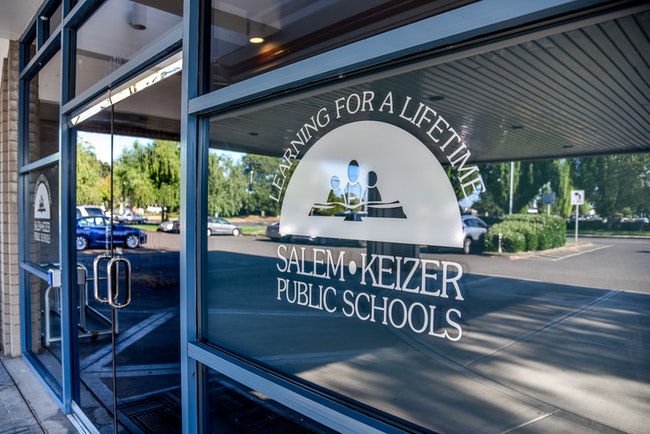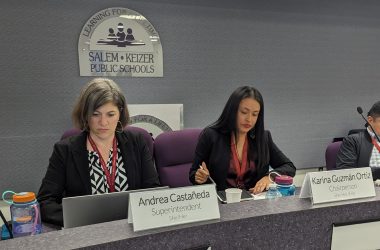
A year of contentious school board meetings and public conflicts with the superintendent hasn’t scared candidates away from the Salem-Keizer School Board.
Eleven candidates are vying for four seats in the May 18 election, and the races are heavily polarized along partisan lines.
Board members, who are unpaid, oversee a $1 billion annual budget and supervise the superintendent, who’s charged with educating more than 40,000 local students.
Only one current board member, Jesse Lippold Peone, is seeking re-election. Kathy Goss, Paul Kyllo and Sheronne Blasi are retiring from their seats. That’s left the field open for political newcomers and drawn challengers to Lippold Peone from both the left and the right.
Though the position is volunteer and nonpartisan, local races have drawn two politically opposed slates of candidates, plus three additional candidates who don’t have any support from political action committees.
Candidates must live in the zone they seek to represent, but voters across the district get a say in all four races. They serve four years on a board that typically meets monthly.
School board elections can be sleepy affairs, and in smaller districts it’s not unusual to have trouble recruiting candidates to run.
Jim Green, director of the Oregon School Boards Association and a former Salem-Keizer board member, said he’s seeing more contested races across the state this year, sometimes with more overtly partisan campaigns.
“I haven’t seen it develop yet in other school districts to the degree that we’re seeing in Salem-Keizer,” he said.
Turnout for school board races has been low, with fewer than 20% of Marion County voters casting a ballot in the May 2019 primary and special district races. But over the past year, education issues have drawn intense public interest across Oregon and in Salem. Parents, students and educators in one community after another have clashed over when and how schools should reopen as Covid restrictions ease.
In Salem, the issue of whether police should remain in local schools provoked intense debate, culminating in a decision by Superintendent Christy Perry in March to stop using school resource officers. Broader discussions continue about how school safety and discipline should look and how local schools should help students who struggled academically and emotionally during the pandemic closures.
On the right, Marion + Polk First PAC, a new political action committee with ties to Oregon Right to Life, is backing a slate of four candidates: Kari Zohner, Linda Farrington, Michael Slagle and Liam Collins. The PAC’s largest donor to date is Oregon Right to Life, campaign filings show, and most of its spending has been to Intisar Strategies, a Salem political consulting firm run by David Kilada, former political director of Right to Life.
Oregon Right to Life’s interest in local school board races dates back almost a decade, and the group provided significant funding to the campaigns of a majority of current board members, including Marty Heyen, Danielle Bethell and Satya Chandragiri. They are not up for election this year.
Lois Anderson, the Right to Life executive director, said the group’s interest in local board races in 2019 was twofold: ensuring Planned Parenthood employees aren’t teaching sex education classes in local schools, and developing more visible pro-life leaders in the community. (Planned Parenthood briefly had a state contract for in-school sex education, but has had no presence in Salem schools since 2015, district spokesman Aaron Harada said.)
Kilada said although Marion + Polk First has strong ties to Right to Life, the PAC was formed to support center-right candidates and issues promoting “opportunity and prosperity” in the region and will stick around after the board races.
The group’s website says it is “fighting back against efforts to adopt an extreme liberal, Portland-centric agenda.” Board members are Reid Sund, Salem Health finance director, Reagan Knopp, political director for Oregon Right to Life, and Debora Nearman, the wife of state Rep. Mike Nearman, R-Independence.
In addition to opposing abortion, Kilada said the PAC looked for candidates who supported returning students full time to school as soon as possible and restoring school resource officers.
District students in all grades are currently attending class in-person two days per week unless their families opted for online-only school. District administrators said in early April they intend to resume full-time in-person school five days per week in the fall while following any health guidelines mandated by the state.
“There’s a lot of people that are really frustrated that kids are not back in school full time,” Kilada said.
Lippold Peone’s 2017 campaign for school board was largely funded by Oregon Right to Life, but he has since distanced himself from the group. Lippold Peone said he didn’t seek any PAC endorsements and is running his campaign himself.
“I’m trying to stay focused on people,” he said. “Whenever we have these special interest groups they have political agendas.”
Kilada said Lippold Peone’s work on the board didn’t align with Marion + Polk First priorities.
“He’s really been focused on process issues rather than getting kids back to school which is our top priority. I also know that he abandoned the pro-life position and then voted for the most pro-abortion member of the board to be chair,” Kilada said. He was referring to Lippold Peone’s vote last July to support Sheronne Blasi, the most liberal member of the school board, for the chair position.
The PAC has raised $16,500, including $5,000 from Oregon Right to Life and $8,300 from small cash contributions of under $100. Chandragiri, the current board chair, contributed $250.
On the left, labor and progressive groups formed the Community for Salem-Keizer Schools Political Action Committee. It recruited and endorsed its own slate: Osvaldo Avila, Ashley Carson Cottingham, Karina Guzmán Ortiz and Maria Hinojos Pressey. The group was formed by members of PCUN, Oregon’s farmworker union, and Progressive Salem and has to date drawn money largely from Stand for Children, a public education advocacy group.
PCUN and Progressive Salem have each been active in past board elections, with PCUN running unsuccessful campaigns in 2019 for Raul Marquez and David Salinas.
This year, the group expanded its coalition, and lists Salem-Keizer teacher and educator unions, the Marion-Polk-Yamhill AFL-CIO chapter, Marion County Democrats and Planned Parenthood among its members.
Reyna Lopez, PCUN’s executive director, said the group selected candidates after interviews led by parents, students and community members. They want a school board that “listens to the community, addresses achievement gaps, and supports the equity work of Superintendent Christy Perry.”
The committee’s website says its candidates support reopening schools “quickly but safely” and advocate for following health and safety guidelines.
“We want to lower political tensions by electing a school board that will center the needs of our students and families by listening to – and seeking out – a broad range of community voices in every decision they make rather than shutting out community input to prioritize input from special interest groups,” Lopez said in an email.
Community for Salem-Keizer Schools has raised $33,316, including $12,072 from Stand for Children and $5,585 from small cash contributions under $100.
Also in the race are Ross Swartzendruber and Richard Riggs, both running to represent west Salem in zone 1, and Lippold Peone, who’s seeking re-election in southeast Salem’s zone 5.
Swartzendruber ran as a Democrat for the Senate District 12, which represents west Salem, in 2020, losing in the primary. His current campaign has raised less than $1,000 so far – all from individual donors.
Riggs and Lippold Peone have both positioned their campaigns as kids-first, nonpartisan efforts in contrast to the organized slates of candidates.
Riggs has raised $3,800 to date from individual donors, state records show.
Lippold Peone’s state filings don’t detail specific contributions. He told Salem Reporter he has so far raised less than the $3,500 threshold where candidates must file individual transactions with the state.
Correction: This article originally misspelled the name of consulting firm Intisar Strategies. Salem Reporter regrets the error.
Contact reporter Rachel Alexander: [email protected] or 503-575-1241.
BE PART OF OUR TEAM FOR SALEM’S BENEFIT: Accurate local information is vital for any community and that’s harder to come by in this day of “anyone can post anything” to social media. People in communities without trained journalists working for them don’t have accurate, trusted information. Help Salem avoid that fate – join in putting fuel in the tank of Salem Reporter to keep it growing, going strong. Here’s how:
SUBSCRIBE: A monthly digital subscription starts at $5 a month.
GIFT: Give someone you know a subscription.
ONE-TIME PAYMENT: Contribute any amount and you support giving the people of Salem local news otherwise missing. (You can also mail your contribution: Salem Reporter, 72585 Middle Fork Lane, Bates OR 97817)

Rachel Alexander is Salem Reporter’s managing editor. She joined Salem Reporter when it was founded in 2018 and covers city news, education, nonprofits and a little bit of everything else. She’s been a journalist in Oregon and Washington for a decade. Outside of work, she’s a skater and board member with Salem’s Cherry City Roller Derby and can often be found with her nose buried in a book.









